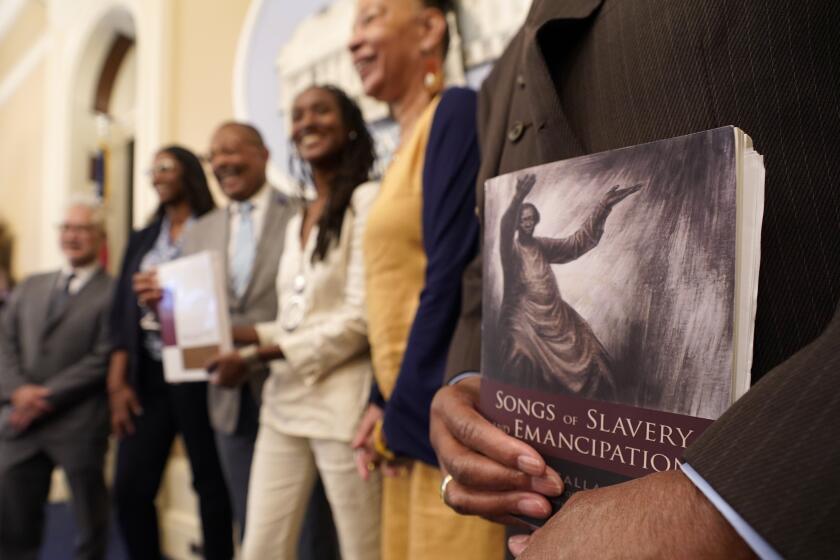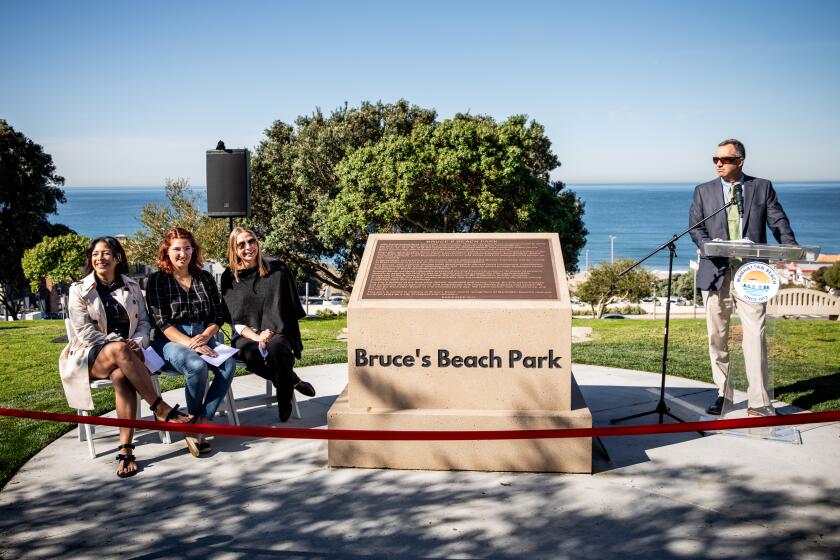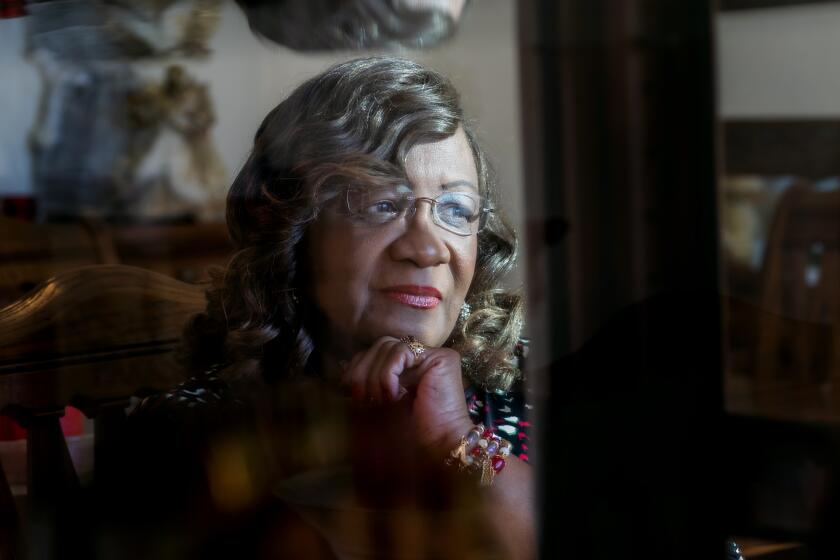Column: Reparations is morally right. But L.A. Democrats will decide if it’s politically doable
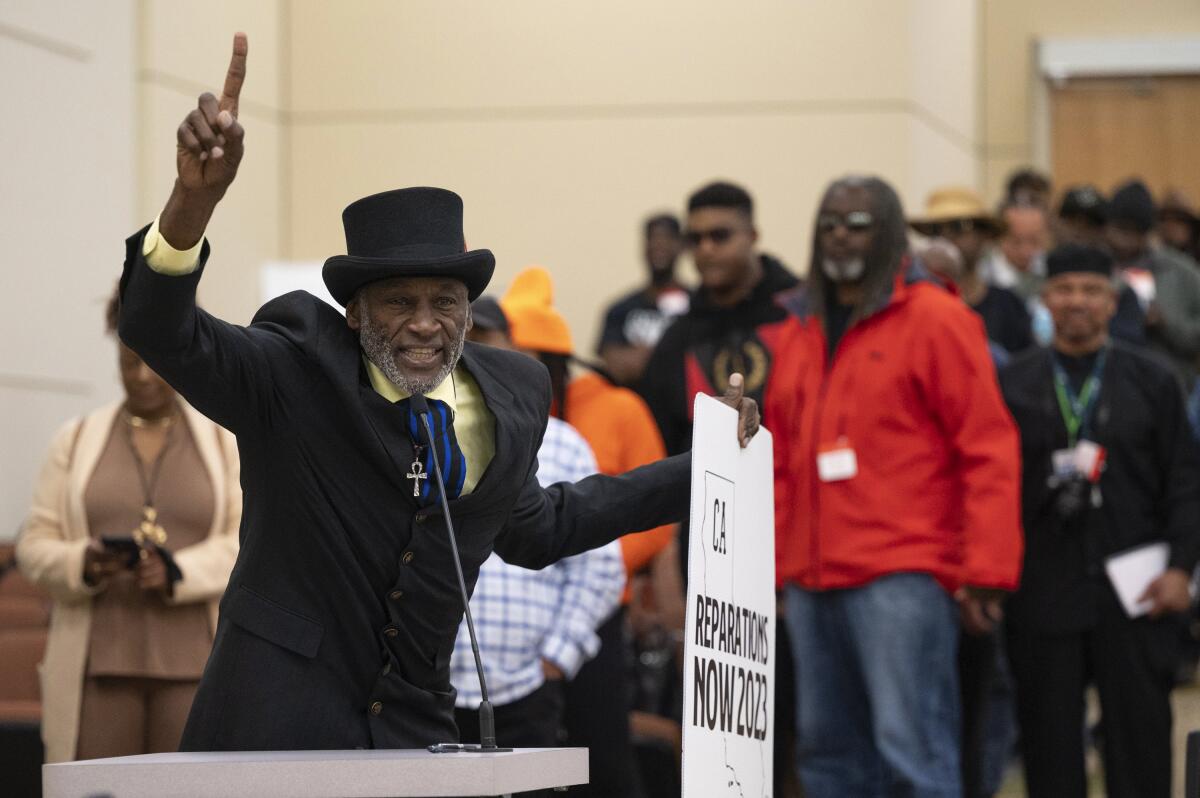
- Share via
One morning a few months back, I came to understand the true meaning of reparations.
I was talking with Gloria Holland, one of the survivors of Section 14, the neighborhood of Black homeowners that Palm Springs burned to the ground in the 1950s and 1960s to make way for the high-end hotels and restaurants that define the city today.
Holland’s family, like many other families, was forced to resettle on a dusty, desolate stretch of desert several miles away. Her voice still cracks with emotion when she talks about it.
“I’m a young girl watching this man stand in this doorway, half-dressed with just his underwear on, pleading don’t kill him and don’t burn his house down,” she told me. “They did it anyway.”
Since those dark days, life has mostly been kind to Holland. For her, money isn’t really an issue. But money — and a lot of it — is the issue in the survivors’ legal claim against Palm Springs, as it should be in any claim of reparations.
California’s Reparations Task Force is concluding a two-year process to study and gather evidence about the harms of slavery and to recommend reparations to the state Legislature.
It’s not because a specific sum will make up for what anyone lost, Holland explained, but because it’s a necessary statement from government about the worth of Black life.
“They undervalue us. And that’s been going on for over 400 years.”
I’ve thought a lot about what Holland said this week, as I’ve watched conservatives react with outrage and liberals with conspicuous silence to calculations from California’s reparations task force about how much Black people have lost and are potentially owed for enduring decades of systemic racism.
We’re talking hundreds of millions of dollars — maybe even, according to one estimate making the rounds, hundreds of billions of dollars. That could go to both Black people like me whose ancestors were enslaved, as well as Black people like Holland, who suffered a specific wrong, in her case by the city of Palm Springs.
“The breadth and depth of the historical and ongoing harm done to this group of people makes clear that the relevant question is not whether compensation should be given,” the task force said in a recent draft report, “but rather, how much is necessary.”
On Saturday, the task force’s nine members will vote on a series of recommendations that justify that compensation, citing a long list of racist laws and government policies that harmed Black people and deprived us of wealth, health and, in many cases, freedom.
But it won’t be easy to get the state Legislature and Gov. Gavin Newsom to actually follow whatever the task force recommends and make reparations a reality by agreeing to pay up. Consider that California’s entire annual budget is only about $300 billion and, lately, there has been a whole lot of hand-wringing in Sacramento over a growing deficit as the economy has slowed.
So, “impossible,” is a word I’ve heard thrown around quite a bit this week. “Absurd” is another.
Meanwhile, polling continues to show flagging public opinion about reparations.
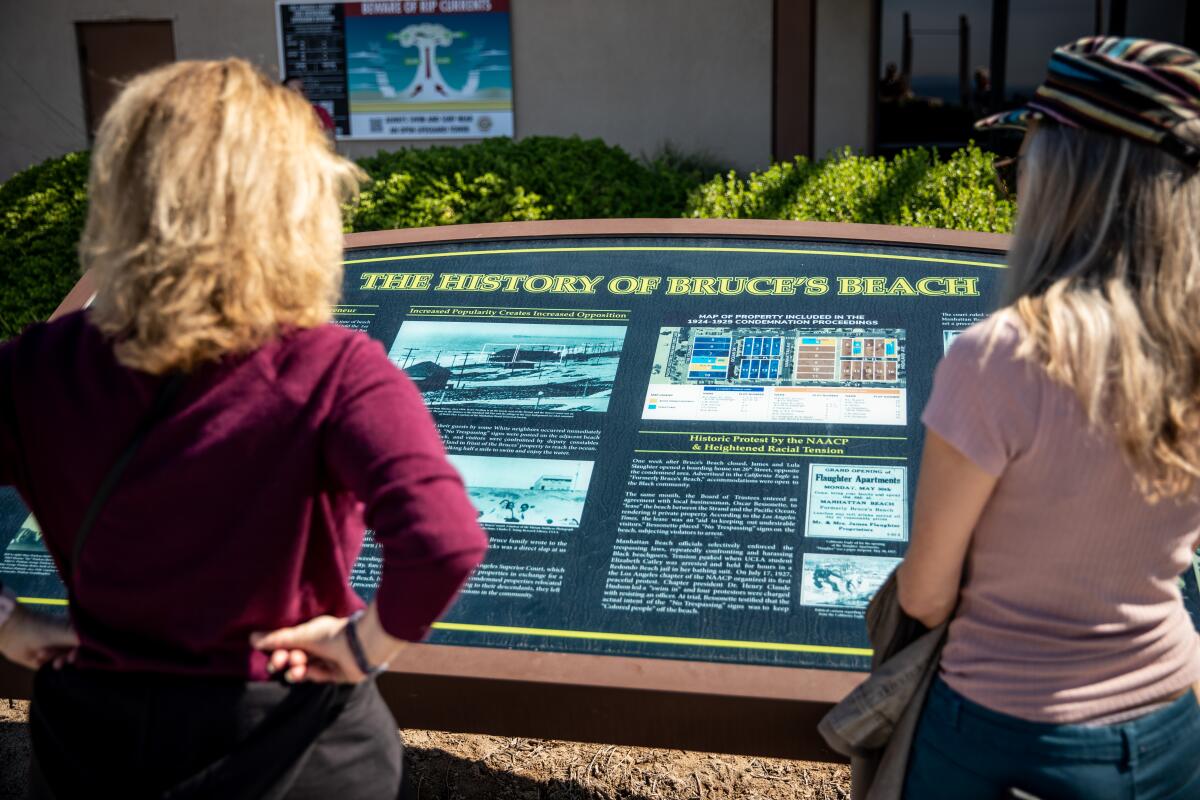
One survey conducted late last year by the Pew Research Center found that just 30% of Americans favor providing compensation to the descendants of people who were enslaved in the U.S., with a full 68% opposed.
Predictably, a majority of Black people — 77% — say descendants should be repaid in some way. But only 18% of white people, 39% of Latinos and 33% of Asian Americans say the same. And cash payments ranked as the least popular option for all the forms that reparations might take.
This is still very much a country that, when it comes to dollars and cents and almost anything else meaningful, doesn’t value Black life. And so, even liberal California is rapidly approaching a crossroads with its nascent reparations movement.
What is morally right is about to run headfirst into what is politically possible. It won’t be pretty, but it will be revealing. Compromises will likely be necessary to get anything close to what’s owed, despite historical fact and the careful calculations of losses that were drawn up by the task force’s economic advisors, led by William Spriggs, chief economist for the AFL-CIO.
Few understand the coming political landscape more than state Sen. Steven Bradford (D-Gardena) and Assemblymember Reggie Jones-Sawyer (D-Los Angeles), the only lawmakers on the reparations task force.
“It’s one thing to be aspirational,” Bradford told me recently. “It is another thing to be rooted in reality of what you can get.”
The task force is required by law to complete its work by July 1 and, after that, will disband after almost two years of monthly meetings. When that happens, much of the work to keep reparations alive in California, and give oxygen to the parallel work happening in many cities, including L.A., will fall to Bradford and Jones-Sawyer.
A new plaque at Bruce’s Beach acknowledges the racist act of eminent domain that destroyed what had been a haven for Black families and beachgoers.
As the latter put it: “There are recommendations and then there’s implementation of legislation. And that [implementation] probably will be the most difficult part.”
It’s still unclear what their legislative strategy will be. Bradford believes it will come in the form of multiple bills, with some up for consideration by next year.
“This is probably gonna be years in the works,” he said. “It’s too much here in this report for me to lead anybody into believing that it’s going to be addressed in one legislative cycle, let alone in one bill.”
Jones-Sawyer isn’t so sure.
“Is it one big bill with everything in it? Is that too much for the Legislature to follow? Or do we have to break it up in pieces so that we know we’ll get something done?” he said, thinking out loud. “Or is the best plan just one big plan and they vote it up or down as one? ... Mr. Bradford and I are going to have to make that determination.”
Whether — as recommended in the task force’s draft report — “a substantial initial down payment” for Black residents who are eligible for reparations gets included in any of those bills remains to be seen. But Bradford is more optimistic about improving homeownership and healthcare.
“Some of the folks that have been our harshest critics — you know, who say, ‘Where’s my check?’ — I don’t want to set folks up for that disappointment if a check never comes in,” he said.
And yet securing support from many of these same critics, along with millions of other Black Californians, will be critical for Bradford and Jones-Sawyer to accomplish anything legislatively in Sacramento. This also could be a problem.
Palm Springs faces a $2-billion reparations claim from Black and Latino families who were burned out of their homes 50 years ago during “slum clearance.”
In the many months I’ve been covering the task force, attending meetings in cities from Southern California to Northern California, it has become disturbingly clear that many people aren’t even aware of the members’ work or don’t understand that it’s the Legislature and the governor, not the task force, that are the ultimate decision-makers on reparations.
“Everybody’s going to have different expectations,” Jones-Sawyer acknowledged, “and so trying to manage those expectations is going to be difficult.”
Working in the lawmakers’ favor will be that providing reparations is truly the morally right thing to do. If that was ever in doubt, the draft report that the task force is discussing Saturday in Oakland makes it abundantly clear.
Based on months of research and testimony from experts, five categories of harm have been identified as appropriate for calculating losses and tallying up potential compensation, given the government data available.
One of those categories is “unjust property takings by eminent domain” — a harm Holland knows all too well as do many others, including the descendants of Willa and Charles Bruce, whose beachfront property was seized a century ago by the city of Manhattan Beach.
So, hundreds of millions — or even hundreds of billions — of dollars in reparations for Black Californians isn’t “absurd.” It’s a sober accounting of what we have given — or, more accurately, been forced to give — to this state and to this country, and what has been taken from us in return.
It’s about the value of Black life.
“You took our valuables,” Holland said. “You separated our families.”
More to Read
Sign up for Essential California
The most important California stories and recommendations in your inbox every morning.
You may occasionally receive promotional content from the Los Angeles Times.
